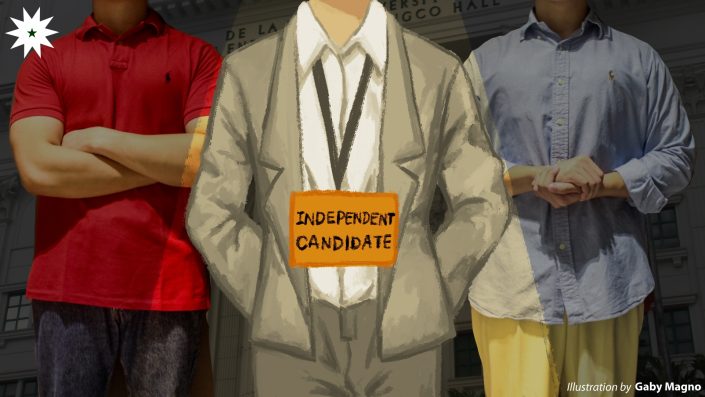Last year’s make-up elections (MUE) saw the candidacy of five independent coalitions after Santugon sa Tawag ng Panahon (Santugon), who had been criticized for alleged red-tagging against rival Alyansang Tapat sa Lasallista (Tapat), opted not to field in candidates, at least under its banner.
The 13-year history of the University Student Government (USG) is no stranger to independent candidates, but last MUE was definitely the first to witness this unprecedented rise of various independent coalitions, more than half of its representatives still composed of Santugon homegrowns, to challenge the University’s dominantly two-party political system that has been in place since the end of Martial Law.
Going their own way
Following the dissolution of the five independent coalitions after MUE 2022, then-runners have tread separate ways, with some rekindling their partisanship and others stepping out of the political limelight.
Incumbent Vice President for Internal Affairs Officer in Charge Ashley Francisco, who then affirmed that she “no longer aligns [herself] with [Santugon’s] values and principles,” now sits as the same party’s college general for the College of Liberal Arts (CLA). The Tindig CLA College President (CP) bet explains that she returned to Santugon after being invited back to help in its rebuilding process.
“It was a call for service, and as a student leader, I could not bring myself to turn down the opportunity to empower my fellow student leaders,” she expounds. Francisco is currently running for the Vice President of Internal Affairs seat under the blue banner.
In contrast, BLAZE2023 Batch Legislator Ina Peñaflor, who ran under the ANGAT coalition after leaving Santugon, opted to join rival party Tapat and be its standard-bearer. She posits, “With activism and youth involvement being close to my heart as my personal advocacies, I refuse to join a party that has a history of red-tagging and a long line of disservice to our students.”
Meanwhile, outgoing Ramon V. del Rosario College of Business CP Tiffany Chua, who ran under ANGAT, expressed that she will neither run nor reestablish her coalition for the Special Elections 2023. However, Chua remains optimistic that future elections will see more independent coalitions, stating that “running for a seat in the USG is really not limited to being a candidate of any political party, and winning in the elections is possible as long as the purpose remains genuinely for the betterment of students.”

Less is more?
USG President Alex Brotonel expresses that working with electeds who came from independent coalitions has given the current administration “fresh ideas and perspectives.” She notes that independent candidates have something new to offer to the student body, prompting her to be optimistic about a possible resurgence of independent candidacies in the future.
“I believe them being part of an independent coalition made them understand things in a different way. And I think that helped us in terms of how to see things, how to perceive issues in the USG and as a student,” Brotonel elaborates.
While the rise of independent coalitions may have presented a unique lens of student governance to the USG, challenging the two-party system through the creation of more political parties—let alone forming independent coalitions—is not all that simple.
No provision in the Omnibus Election Code and the Student Handbook limit the number of parties running for elections, but it is uncommon to see students challenging the prevalent two-party system. Assistant Professorial Lecturer Antonio Borja from the Department of Political Science and Development Studies explains that “pressures in terms of time, resources, and organizational requirements” may come into play as to why like-minded students cannot just easily form political parties. This has been reflected by the experiences of independent runners, who had to make do with their meager budget, as opposed to large alumni-funded parties.
Meanwhile, Professional Lecturer Gerardo Eusebio from the same department delved deeper into the electoral aspect of a multi-party system. Having more than two parties, which may result in having no clear majority within the electorate, would be more detrimental than beneficial.
“It could be possible that a party will win without majority backing of the studentry. That’s what you call plurality, and pluralities are not really good,” he opines.
Eusebio then cited former President Fidel Ramos’ bid in the 1992 presidential election, noting that Ramos’ win with only about 24 percent of the total votes initially received widespread opposition that “almost created a political crisis.”
Measuring the weight
Students share varying sentiments about having more independent candidates and integrating more political parties. After Santugon’s withdrawal from the previous election, Bea* (III, POM-BSA) realized how independent candidates proved that having a political affiliation is unimportant in securing a seat in the USG.
“The candidates in one party are still [individuals] whose policy preferences and values do not always align with their fellow candidates. Last year’s elections showed us how independent candidates can be personally disassociated from their parties,” she posits.
For Karuna Mansukhani (III, BS-AEC), she thinks that introducing a new party might just be a lost cause as the newly-formed party might “get bashed on or will struggle to have their candidates elected.”
Ultimately, students call on the candidates, whatever their political affiliation may be, to create a less toxic environment and focus on bringing forward genuine student service and representation.
They must “lead by example, basically, for they are and should be the standard of the student body right when they decide to run for office,” Jeff Lopez (II, BS-LGL) asserts.
With reports from Michael Hamza Mustapha and Amanda Palmera
*Names with asterisks (*) are pseudonyms
